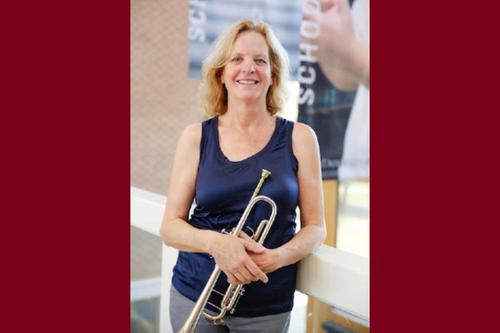
Across sectors, the “gig economy” is on the rise as employers are opting to contract work rather than hire employees for full-time positions with benefits. While the concept is a new frontier for many workers in traditional 9-5 office roles, the gig economy is more than familiar to the professional musician.
Marissa Benedict, newly appointed assistant professor of trumpet at the University of Minnesota School of Music, answers questions about navigating the emerging gig economy and offers strategies to prepare the next freelance generation to be competitive in the new economic landscape.
Q: How do you as a professional musician interpret the rise of the gig economy?
Asst. Prof Benedict: Freelance musicians have used the gig economy for more than 100 years. The term gigging started with jazz musicians in the 1920s and was a way for them to express themselves, work and make money. It allowed them to move around easily, play when and where they liked and gave them time to practice and do other things they enjoyed.
The gig economy is happening for many reasons. Technology plays a big part. With smartphones, access to the virtual world market is easier and faster. You can reach almost anyone at any time with instant results. Being a gigger or more likely an independent contractor is very attractive to the corporate world. They can employ you, but they don’t have to pay benefits or provide a workspace, making it less expensive for them yet profitable for the freelancer. And for the newer generations, the thought of having a freelance job with more flexibility and working from home fits into their creative and entrepreneurial lifestyles.
Q: What are the most useful skills you developed during your time as a freelancer?
Asst. Prof Benedict: Some of the most important skills I’ve learned along the way — and am still learning — are discipline, responsibility, good people skills, networking, communication, marketing, organization and, one that most people don’t think of, accounting.
As a freelancer, you have to be on time and prepared for anything. If a musician is late once it might not mean much if there is an excuse attached to it. But if it happens again, not only will you lose that job, word of mouth spreads quickly that you’re not responsible. Even if you’re a good player, your reputation is only as good as your last performance. If you have good time management, you’ll be on time and ready to go. If you’re responsible, you will practice your music ahead of time and do what it takes to show your employer they want to continue working with you.
Q: What advice can you offer new freelancers of all fields on standing out from the competition and creating a reliable income?
Asst. Prof Benedict: The work possibilities and opportunities are greater due to today’s world of technology. However, because of social media and the instant responses necessary, the freelancer is not just gigging anymore. They are constantly working to maintain the relationships they have and create new ones. I would tell new freelancers to:
- Build relationships in and outside of work
- Keep your social media up to date, but keep your opinions and personal life private
- Develop marketing and basic accounting skills
- Think outside the box to determine what can set you apart from your competition
- Be on time, show up prepared and be pleasant to work with
- Repay niceness
- Be fair and honest with colleagues
- Don’t gossip
- Be frugal
- Become a contractor, learn to farm out work when you become busy and be open to working outside of your main instrument or passion.
Q: What are the biggest obstacles you face as a freelancer and have they changed over time?
Asst. Prof Benedict: Outside of playing and performing, there are many things that can affect you as a freelancer. As a young player, I had no idea what managing your health insurance meant. For example, because we are driving more than most and at all hours of the day, the odds of you getting in an accident are not in your favor. It can happen — and did happen to me — and it was life-changing.
The longer I have been in the business of music freelancing the more I have seen contractors and conductors come and go. When this happens personnel can change even if you’ve done nothing wrong. You need to reach out and make them aware that you’d like to stay, but you have to be aware that it might not happen. Although difficult, you must learn to let go of that which you can’t control.
Learning how to balance family and work is also important. In the freelancing world, it is very hard to turn down work. We worry that if we don’t accept the job that someone else will get it and that we will lose the account. When you choose to have a family, there are responsibilities that will be more important than work, so you must be careful to keep everyone — family, employers and most importantly yourself — happy.
Q: How can educators help students prepare for the gig economy landscape, including those who have not freelanced themselves?
Asst. Prof Benedict: Preparing students for the gig economy involves teaching them all the practical skills of maintaining a successful business. You must know your craft, master it and remember that there is always something you can learn to better yourself. It may mean practicing, studying, expanding, remembering what you already know and making it better. Remember to continue learning, which could mean getting better people skills, mending relationships or creating relationships. Don’t be afraid to supplement your income when work is slow. There are plenty of side jobs outside your main source that can help when work is slow. Most of all, respect who and what came before you.
The only thing that someone who hasn’t freelanced might not understand is the feeling of risk and instability that freelancers experience, but educators can teach students skills to prepare them to use their downtime to create new opportunities and find new work.
Marissa Benedict is an assistant professor of trumpet in the School of Music in the College of Liberal Arts at the University of Minnesota. She serves as Principal Trumpet with the Pasadena Symphony and Pops Orchestra and is Associate Principal Trumpet at Long Beach Symphony and Pops. She performs regularly with the Los Angeles Philharmonic, Los Angeles Opera, and the Los Angeles Chamber Orchestra. Her performing credits also include soundtracks for movies such as “The Incredibles II” and at the 91st Academy Awards.
- Categories:
- Arts and Humanities





